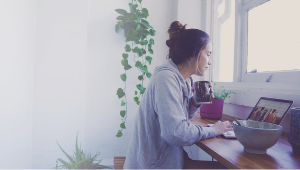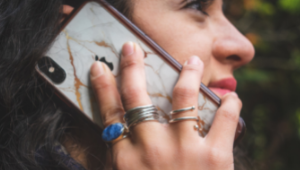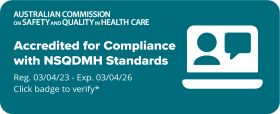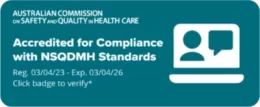Accessibility Tools
- Content scaling 100%
- Font size 100%
- Line height 100%
- Letter spacing 100%
A few months ago, the Victorian Government announced an unprecedented $3.8 billion dollars to start implementing all 65 recommendations handed down by the Royal Commission into Victoria’s Mental Health System.
It is clear that the voices of SANE’s communities were heard by the Royal Commission. SANE Peer Ambassador Sandy Jeffs OAM, gave evidence during the Commission’s hearings, along with Janet Meagher AM, Patron of the Anne Deveson Research Centre and a range of other experts associated with SANE. Many of the issues that SANE raised in our 2019 submission to the Royal Commission were reflected in the Final Report.
Additional Info
- Hide Title on Category Page No
- Hide Image on Category Page No
- Hide Intro Text on Category Page No
- Disable Links No
- Disable Category Body Padding No
- Item Page Full Width No
- Hide Social Icons No
- Hide ReadSpeaker No
Supporting an author with their book which focuses on mental health
Opportunity: An author and journalist who has previously collaborated with StigmaWatch for journalistic purposes asked StigmaWatch to review chapters of her upcoming debut book which has a focus on mental ill-health.
The author asked for feedback on any stigmatising language, whether it was appropriate to add help-seeking information, if any disclaimers were required at the start of the book, and the potential implications of naming a mental health facility in the publication.
Result: The author’s chapters are well researched and written with consideration, and after reviewing the work, StigmaWatch provided feedback on small changes to copy, suggested to add appropriate help-seeking information, and offered considerations for her decision-making in naming the mental health facility.
Why it mattered: Mental health is an important topic for the Australian media, authors, and communications professionals to report on and discuss, however it is equally important to do this in a safe and responsible manner that doesn’t contribute to stigma in the community.
The author was proactive and sought support from StigmaWatch to ensure her work would not cause harm in the community, and instead could very well reduce stigma surrounding mental ill-health in the community.
Our Peer Support Workers are here to offer non-crisis related peer support. Our Peer Support Workers have their own lived experience of navigating some of the issues you might also be facing. They are trained to best support you.
We are here to listen without judgement, whether you are struggling with mental health issues, feeling isolated or needing someone to connect with who gets it.
Connect with a Peer Support Worker in the way that works for you, available Monday to Friday, 10am - 4pm AEST/AEDT.
Peer Support Workers do not have a direct phone number to call. If you miss your scheduled call, you can wait for a follow-up call, or get in touch via email.
If you contact us, we will:
- Listen respectfully and provide a safe and supportive space, no matter your gender, culture, ethnicity, religion or sexual orientation
- Safely share our own experiences of mental health to support you on your own recovery journey
- Provide you with a safe and non-judgemental space to talk about what’s going on for you
- Suggest places to get additional support according to your needs and goals
- Take notes about our contact so that we can offer you consistent, personalised support without you needing to re-share your story
- We will keep your information and experiences confidential. The only exception is if we have genuine concerns for your immediate safety or the safety of someone around you
- Consider your personal needs and share with you if we think another service may be better suited to offer you support
- Collect data to improve and inform our service model
- Contact you within 48 hours.
Please note that we are not a crisis service.
If you, or a person you are caring for is experiencing emotional distress, please call Lifeline on 13 11 14 (24 hours / 7 days) or chat to a crisis supporter online at lifeline.org.au (7pm - midnight every night). Alternatively you can call the Suicide Call-back Service (1300 659 467) for support around suicide. In an emergency, please dial 000.
Additional Info
- Hide Title on Category Page No
- Hide Image on Category Page No
- Hide Intro Text on Category Page No
- Disable Links No
- Disable Category Body Padding No
- Item Page Full Width No
- Hide Social Icons No
- Hide ReadSpeaker No
SANE invites you to 'Discover More' about people living with schizophrenia
Media release: 21 May 2021
During this year’s Schizophrenia Awareness Week, from Sunday, May 23 – 29, SANE invites and encourages the community to ‘Discover More’ about the creative and passionate people living with schizophrenia.
SANE is encouraging Australians to look beyond the diagnosis, and celebrate the people living with schizophrenia who have unique and powerful stories.
Through storytelling by SANE Peer Ambassadors – people living with schizophrenia and other mental health issues, SANE provides opportunities for the community to develop a new and real perspective of life with schizophrenia.
Additional Info
- Hide Title on Category Page No
- Hide Image on Category Page No
- Hide Intro Text on Category Page No
- Disable Links No
- Disable Category Body Padding No
- Item Page Full Width No
- Hide Social Icons No
- Hide ReadSpeaker No
With Schizophrenia Awareness Week fast approaching, this year SANE is inviting people to ‘Discover More’ about its creative and passionate community living with schizophrenia.
In addition to encouraging everyone to ‘Discover More’ about schizophrenia itself, which affects roughly 20 million people worldwide, we’re sharing our Peer Ambassadors’ stories to spotlight their challenges, successes, hopes and tips for living with schizophrenia, and to share the many things they’d like others to discover about their lives.
Take a look at the many ways you can join the discussion with SANE during Schizophrenia Awareness Week, held Sunday 23 to Saturday 29 May 2021.
Additional Info
- Hide Title on Category Page No
- Hide Image on Category Page No
- Hide Intro Text on Category Page No
- Disable Links No
- Disable Category Body Padding No
- Item Page Full Width No
- Hide Social Icons No
- Hide ReadSpeaker No
Quick Facts
Australia is a diverse country, with people from many different cultures, backgrounds, religions, and ethnicities. Anyone can experience distress or mental health issues. It’s important that every Australian has the opportunity to live a full life, free of discrimination and with access to help when they need it.
- In the last census almost half of all Australians were either born overseas or had a parent who was born overseas.
- Immigrants are under-represented among people who use mental health services in Australia.
- Refugees and asylum seekers have low access to mental health services.
-
Common challenges
Stressful events around migration, seeking asylum, and discrimination can impact wellbeing and mental health for individuals, families, and communities. These can include:
- Separation from cultural identity and loss of close family ties
- Being exposed to trauma prior to migration
- Stress associated with migration
- Experiences of racism and discrimination
- Detention of asylum seekers
- Lack of culturally appropriate services
- Stigma around mental health within communities
- Language barriers
- Uncertainty of visa status
- Unfamiliarity with the Australian mental health system and processes.
-
When to get help
Professional support can help people cope with these stressful situations. Talking to a trusted person also helps many people feel less alone.
If you notice any of the following experiences, and they are impacting your daily life, telling someone you trust or a health professional can be the first step to seeking support:
- Changes to sleeping or appetite
- Feeling lonely, isolated, or not good enough
- Changes in behaviour – more alcohol or substance use
- Thinking about harming yourself or ending your life
- Hearing or sensing things that may not be real
- Not doing things you used to enjoy
- Not taking care of personal hygiene or your usual daily tasks
- Talking or socialising less than previously
- Having thoughts that are confused or very disorganised.
-
Help for family & friends
It’s common for family members to take on a caring role for someone going through mental health issues.
There are services that support family, friends, and carers and provide a way of connecting with others who may share your experience:
- Mental Health Carers Australia - 1300 554 660
- Carer Gateway - 1800 422 737
- SANE Friends, Family & Carers Online Forum
-
Racism and mental health
Experiences of racism cause distress and adversely affects mental health in immigrants and refugees.
If you have experienced racial discrimination, you can report it to the Australian Human Rights Commission. Call 1300 656 419.
-
References
Australian Bureau of Statistics. (2017). 2016 Census: Multicultural.
Ferdinand, A. S., Paradies, Y., & Gelaber, M. (2015). Mental health impacts of racial discrimination in Australian culturally and linguistically diverse communities: a cross-sectional survey. BMC Public Health, 15.
Minas, H., Kakuma, R., Too, L. S., Vayani, H., Orapeleng, S., Prasad-Ildes, R., Turner, G., Procter, N., & Oehm, D. (2013). Mental Health Research and Evaluation in Multicultural Australia: Developing a Culture of Inclusion. Mental Health in Multicultural Australia.
Finding support in your area
There are many services available across Australia which can help with your mental health. Some can connect you with other people going through similar experiences or support services in your community.
The SANE Online Community Forums (SANE Forums) involve two online communities:
- one for people living with complex mental health issues (Lived Experience Forum)
- one for those supporting someone living with complex mental health issues (Carers Forum).
Goals
The 2020 SANE Forums evaluation aimed to identify whether the SANE Forums are meeting their goals. These goals include creating strong communities, extending the reach of mental health services, and providing high quality peer support.
Methods
This study included the following:
- A review of reach and engagement data (from online tools: Khoros Community Analytics and Google Analytics)
- An online survey of people who access the Forums ('Forum Users')
- In-depth interviews with Forum Users
We collected data from Forum users in July-August 2020. We also reviewed reach and engagement data for the period July 1 2019-June 30 2020.
Acknowledgements
The study team wish to give heartfelt thanks to everyone who participated in this evaluation study.
More information
For more information about the SANE Forums evaluation, please contact the study team through This email address is being protected from spambots. You need JavaScript enabled to view it.
Additional Info
- Item Page Full Width No
- Hide ReadSpeaker No
- Category Title SANE Forums Evaluation
-
Category Image (300 x 170)

- Category Image Alt Text patient visiting doctor
The SANE Help Centre provides counselling and support to adults affected by complex mental health issues. This includes people living with complex mental health issues, their carers, family and friends, and mental health professionals.
In 2020 SANE conducted the first formal evaluation of the Help Centre, including its helpline, webchat, and email services.
Goals
The goal of the evaluation was to better understand who uses the Help Centre, why they use it, how it benefits them, and how satisfied they are with the service.
Methods
During August to September 2020, we surveyed people that had used the Help Centre in the last year (i.e., service users). We also conducted interviews to gain a deeper understanding of how service users engaged with the Help Centre.
Information captured through our routine data collection was also used to understand the reach of the Help Centre.
Acknowledgements
The study team wish to give heartfelt thanks to everyone who participated in this evaluation study, in particular the people that use and support our services.
More information
For more information about the SANE Help Centre evaluation, please contact the research team through This email address is being protected from spambots. You need JavaScript enabled to view it.
Additional Info
- Item Page Full Width No
- Hide ReadSpeaker No
- Category Title SANE Help Centre Evaluation
-
Category Image (300 x 170)

- Category Image Alt Text patient visiting doctor
People who live with schizophrenia spectrum disorders and alcohol and other drug (AOD) use disorders experience high rates of stigma and discriminations across a range of life domains.
Although these disorders have been shown to frequently co-occur, little is known about how experiences of stigma and discrimination differ between people who live with single vs dual diagnoses of each.
The research
The aim of this PhD is to compare how Australians living with schizophrenia spectrum disorders – both with and without co-occurring AOD use disorders – experience stigma and discrimination in their relationships, and how these experiences are informed by public stereotypes.
A series of surveys involving both people who have lived experience of these mental health issues and members of the general public will be conducted to explore these questions.
This PhD began in June 2020 as part of the National Stigma Report Card project, which is led by SANE in partnership with the Melbourne School of Psychological Sciences, with the support of the Paul Ramsay Foundation.
Expected Outcomes
The findings of this PhD will support efforts to better understand the experiences of people living with dual diagnoses of schizophrenia spectrum and AOD use disorders, as well as helping to inform related stigma reduction efforts.
Team Members
- Beth Hobern
PhD Student, University of Melbourne
Research Assistant, Telehealth and Stigma Lab – Brain and Mental Health Hub, Melbourne School of Psychological Sciences, University of Melbourne - Dr Michelle Blanchard
Former Deputy CEO, SANE and Director, Anne Deveson Research Centre
Special Adviser, National Mental Health Commission
Honorary Senior Fellow, Melbourne School of Psychological Sciences, University of Melbourne - Dr Christopher Groot
Research Lead, National Stigma Report Card
Director, Telehealth and Stigma Lab – Brain and Mental Health Hub, Melbourne School of Psychological Sciences, University of Melbourne - Dr Imogen Rehm
Research Fellow, National Stigma Report Card
Honorary Fellow, Melbourne School of Psychological Sciences, University of Melbourne
Additional Info
- Item Page Full Width No
- Hide ReadSpeaker No
- Category Text How do people living with schizophrenia, with and without AOD use disorders, experience stigma and discrimination?
-
Category Image (300 x 170)

- Category Image Alt Text Podcases and mental health - man listening to podcase on headphones
Studio Dax welcomes inaugural show, Human First? by artist, Güler Altunbas
Media release: 3 May 2021
Güler Altunbas’ Human First? exhibition is disability-led storytelling, through the medium of digital art.
The inaugural show of Studio Dax, at The Dax Centre, Parkville opens on Thursday May 6, and examines the artistic experience of people who identify as D/deaf and disabled, chronically ill, neurodiverse, or who have lived experience of mental health issues.
Melbourne-based artist, Güler Altunbas, aims to bring together a diverse cross-section of other art-makers to demonstrate the richness in cultures within the disability community.
Human First? pairs video interviews with digital portraits to tell the stories of ten D/deaf and disabled artists.
The presentation of Human First? also demonstrates Altunbas’ own artistic process while each artist discusses their unique practice.
Additional Info
- Hide Title on Category Page No
- Hide Image on Category Page No
- Hide Intro Text on Category Page No
- Disable Links No
- Disable Category Body Padding No
- Item Page Full Width No
- Hide Social Icons No
- Hide ReadSpeaker No








